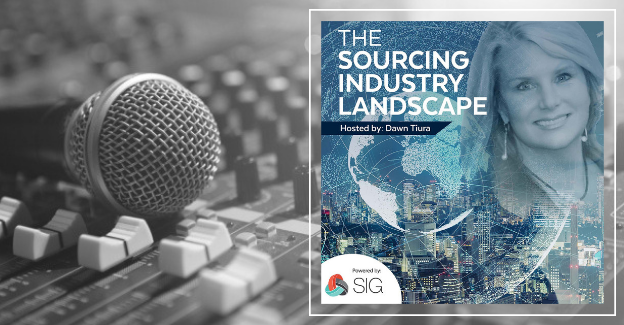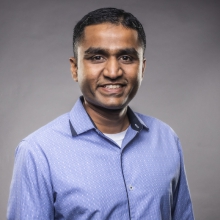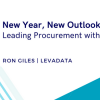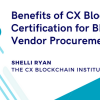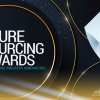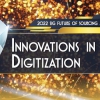In this episode of the Sourcing Industry Landscape, Dawn Tiura interviews Siddharth Ramesh. Sid comes from KPMG, where he managed a diverse portfolio that shaped his techniques for sourcing strategies that he uses today. Sid now works at VSP Global, under the leadership of their CPO Greg Tennyson, primarily in the vision insurance space and providing affordable eyecare globally.
Dawn Tiura: Hi folks. This is Dawn Tiura from SIG and I am so excited to talk to Siddharth Ramesh. He's with strategic sourcing and procurement. He also has an MBA and he's with VSP Global. Now I won't hold it against Siddharth, that he did go to Ohio State University, since I am a wolverine, but other than that I really like the gentleman. So Siddharth, welcome to the podcast.
Siddharth Ramesh: Thank you Dawn. Very happy to join you for this session here.
Dawn: So you work for a man who really is a legend in the industry, but-
Siddharth: Yes.
Dawn: You have built an incredible career to get you where you are today. So can we take a little bit of time and just talk about how you ended up at VSP Global and what got you into sourcing in the first place?
Siddharth: Yeah. Sure. So a very interesting story. I happened to actually land in sourcing not by choice, but just by fate I think. So, if you look at my carrier, I did my undergraduate in electrical engineering, dabbled in software engineering for a couple of years. And figured, okay I needed to move onto the business side of things, which is when I realized okay, an MBA might maybe pave the path to do that.
Siddharth: I was very much interested in supply chain and finance and so I chose Ohio State University, to come and pursue my MBA. Had a fabulous time over the two years learning different concepts, participating some internships. And right out of MBA, I actually landed a job in strategic sourcing. More on the technology side, primarily because of my technology background.
Siddharth: So when I started out my career in procurement, I was actually a project manager, like the global project manager for deploying Ariba e-sourcing and contracts and supplier information management, for a company called Reed Elsevier. And I was part of their global procurement organization. And from there on, my next gig was actually with KPMG, in the Strategic Sourcing and Procurement consulting space.
Siddharth: Which I think was one of my, kind of like, tremendous opportunities to not only have an increased ramp-up to learn strategic sourcing concepts, but also to apply them across a diverse industry portfolio. I had clients across utilities, higher education, financial institutions, pharmacy, benefits management. And so I think time that I spent in KPMG, was hugely important in terms of molding and shaping up like my leading practices around strategic sourcing and-
Dawn: I think a stint at KPMG would have been awesome for you to learn the different industries and realize that once you really know sourcing, you really can source anything. You don't have to be a technical expert, you can get that expertise.
Siddharth: Yes. Absolutely. And I totally have to agree with you there, because what you get through those type of consulting experiences, is you become like this gender list around categories, right? So you get exposure, whether it's marketing services or advertising or IT, software or cloud services. I think the exposure that you get across different categories, helps you become that sourcing expert from a process standpoint.
Siddharth: And then as you said, totally agree that anybody that understands the sourcing function very well, should be able to pick up a category and go through that seven steps, eight steps, whatever that flavor is and execute on that sourcing strategy.
Dawn: So then you went to VSP Global, which not everybody knows, but it's a huge company and it probably touches more of us than we realize.
Siddharth: Yes. Absolutely. VSP Global is a very interesting company. We are in primarily in the vision insurance space; our mission is to help people see. And a large part of our effort goes towards providing affordable eyecare and eyewear, so that people can continue to have access to see, which is hugely important. What happened and how I landed at VSP Global, very interesting story.
Siddharth: So Greg Tennyson, who is the CPO here, had just joined VSP back in early 2014 and he was tasked to mature and centralize the entire procurement function here at VSP, which was very transactional and siloed back then. And I was one of Greg's first hires. I was incidentally looking at the same time, trying to get some reasonable work-life balance coming out of, like, the travel industry.
Siddharth: And the opportunity was perfect. I landed here, it's been an amazing five years along with Greg and some of the other leaders here, working on procurement transformation, helping implement some of the learnings and experiences that I had throughout my consulting journey, back here to industry. And we've had some tremendous success, widely recognized by organizations such as SIG, made real good partners on the technology side, helping our like tech stack here. And I think we have matured, which is a testament to how we have grown over the last five years.
Dawn: Yeah. I think it's fantastic watching the journey. And Greg Tennyson is truly a legend in our industry, and an industry leader. So, you couldn't have landed in a better place when you got some work-life balance and got off the road. But then you also went back and got your Certified Sourcing Professional certification through SIG. And so how did that help shape your organization as well?
Siddharth: Yeah. I think one of the best initiatives that Greg had for our entire team, was this increased focus on continuous learning and continuous improvement. And one of the best avenues that we had, was to actually engage with Sig and understand how we could go through the Certified Sourcing Professional course. And in fact, incidentally Greg, myself and my manager Dennis, we were like the pilot for our entire group, to go through the first training program; 12 weeks highly intensive and focused training across different sourcing modules.
Siddharth: And it was amazing to have, not only a refresher on some of the tried and tested sourcing concepts, but also get introduced to some very important concepts such as third-party risk management, which I think is pretty huge and it's actually coming up across many companies and industries, this day. Very informative and was very useful to actually go back to our team and say, "Hey, we just went through this course at a high level management level. And I think there is a huge opportunity for the entire team, to learn different aspects of strategic sourcing and procurement." Going through that course.
Siddharth: And eventually what we did, was we actually took our entire team of 20 plus folks, go through the Certified Sourcing Professional Training Program. And I'm very proud to say that all of us are actually CSP certified. And I think that has a huge value add when we talk to our internal business partners as well as our suppliers.
Dawn: Yeah. It does. And it also gives you all a common framework and a common language, since you all come from diverse backgrounds. And like you said, is it a five step process, a seven step process?
Siddharth: Yes.
Dawn: And it's nice when everyone can finally come around a common terminology about everything.
Siddharth: Yes. Yeah. The definitions and the understanding of... Because again, as I said, when I came from KPMG, I started using some of methodologies over there, training the teams out here and we had some success, but getting to that common platform was hugely beneficial. So that we can have like a shared consciousness around our understanding of strategic sourcing and procurement.
Dawn: Yeah. So I want to tell you thank you, because it's been such a great model. We have a number of companies now that have put 100% of their sourcing professionals through it and now they're all going over to the third party risk management certification. So really I'm just really pleased that it resonated with someone with as much experience, that you had that you wanted your team to go through it. So that means a lot to me.
Siddharth: Yes. Definitely.
Dawn: Tell me, so you ended up in sourcing by chance. because you wanted to get to the business side. How do you like it comparing and contrasting to engineering? Where do you think it's so exciting?
Siddharth: That's a great question, because in my day to day life, I actually deal with a lot of the engineers, because my forte is in the IT space. I have specialized in IT category management across hardware, software and services. So I get to still be a good liaison between my business partners, who are primarily in the engineering space, versus the suppliers. What excites me about sourcing, is the ambiguity and the vagueness that I get to deal with almost every day.
Siddharth: Like every project you would think yeah, I've done this like four or five years. Yeah. I should probably just be a cakewalk, right? And there're those projects, that are mostly the commodity type purchases or projects that are easy to pass through, but every new project, and as technology keeps evolving, not just from a sourcing and procurement standpoint, but even generally, right?
Siddharth: From a needs as people look to the cloud, as people look artificial intelligence and RPA and various different initiatives and innovations that are happening out. It's not the same contracts and the same terms and conditions, that we are used to dealing with, right? So what applied five years back, probably doesn't even apply 100% today, or even like 50% today.
Siddharth: And so it's that constant learning that the ambiguity and the vagueness poses, is what is very exciting. Aside from… Go ahead.
Dawn: I would say most people would say ambiguity and vagueness is not exciting, it's scary. So the fact that you embrace it, tells everybody a lot about who you are.
Siddharth: Yeah. I think one of the things that I've obviously learned from mentors and advocates, is yeah, yes, it's great that if you can be really good at something and get really comfortable at doing that, and that'll take you some place, but the only way to grow is to figure out how you can challenge the unknowns, right?
Siddharth: And so I think that's part of what I have embedded into my learning culture and it's been very helpful here as I work with Greg and some of the others here, to keep moving the needle on our procurement journey.
Dawn: That's really great. So tell me, coming from engineering backgrounds, hard science background, you need so many people skills to be successful in sourcing. You need to be a strong communicator, you need to have sales skills. Tell me, if you were to describe a really well rounded sourcing professional today, what are the skillsets you look for?
Siddharth: Sure. So from a PR skillset standpoint, right? I would say three big skills, it's very, very important. One is I think as I said, right? Ability to analyze and then problem solve, right? Because we are in the problem solving business, we are solving problems for our business partners. And the second, is like patience and listening. As long as you can listen to your stakeholders, to your suppliers and use their time to help drive, database their decisions, right?
Siddharth: So then I think that will help further your credibility in this space. And the third, I would say and I think it's mostly important, is just primary sourcing skills such as negotiations and working with suppliers and collaborations. I think it’s a given that negotiations should be part of any sourcing manager’s or sourcing professional’s repertoire. It's a constant improvement, right?
Siddharth: There's still like lots of trainings out there, there's still like practices out there, that you can focus on, where you can still improve on your negotiation and persuasion skills. I would say, I think that the persuasion and the ability to influence, right, is very important when it comes to sourcing professional.
Dawn: Yeah. Persuasion is extremely important. Great. So now, but you work for Greg and Greg is a technology guru. He's always trying to embrace and find and mentor the latest technologies. Do you see technology really impacting sourcing in the future?
Siddharth: I think so, yeah, definitely. Obviously there's a lot of companies, lot of solution providers out there, so trying to figure out, right? How do we get to that sweet spot that can best serve a customer? Like VSP Global, right? So we have needs for sourcing, needs for contract life cycle management, needs for supplier performance management, needs for the entire P to B space.
Siddharth: And then how do we figure out a seamless way to have all of these integrate so we reduce the reliance on a lot of manual transactions and manual follow-ups. And help the sourcing team focus more on the strategic initiatives, right? So, I think that's the area where technology is going to play a key part, in terms of helping reduce and take away all of the mundaneness and the routineness, out of the transactional sourcing processes.
Siddharth: And help the sourcing managers and the sourcing teams, to be more effective in dealing with internal business partners and suppliers. And taking away like processes that don't add much... I wouldn't say not much value, but taking up a lot of bandwidth I would say within the teams.
Dawn: Yeah. And then smart people don't want to do transactional work. So the more we can automate it, the better off we are as an industry.
Siddharth: Yes, yeah. Totally agree.
Dawn: Retain good people. Yeah. So I like that. So are you guys doing any RPA or AI initiatives right now? Are you into that?
Siddharth: So, on the spend analytics side, we work with a company called Supplier-E and they provide spend analytics platform. There is some AI that goes in the background, in terms of helping us understand how better we can look at our spend, and how we can use that to, again make data driven decisions, right? That can help influence some of the purchasing decisions and the sourcing decisions, that our stakeholders would want to do, right?
Siddharth: There are, I think, initiatives that we still like fully executed on, but we do want to use RBA to look at some of the transactional processes, as we discussed earlier. Something like for example PO edits, right? Now we have a full time employee doing that. And how do we transition that to an automated bot or something that can actually look at POs and look at price sheets, and make the edits within their space.
Siddharth: So that we could free up that individual's time to do more strategic activities. So yeah, things like that, that are on the horizon. Very excited to see how they will be implemented in the next one or two years.
Dawn: Yeah. It's going to be exciting times I agree. So what do we see in your future? Where do you see yourself in five years?
Siddharth: Great question. Something that actually Greg keeps asking me. I think I see myself growing in this space. I think I'm very much attached to the sourcing, procurement, technology space. One of the key things that I do really want to do and grow on, is how do I contribute more thought leadership to the entire procurement community, right? And so part of that is, my journey is, I think since last year I've started participating in a number of external events, conferences.
Siddharth: In fact, I had a fabulous opportunity last year at the SIG fall summit, to present to the entire audience around our procurement transformation journey at VSP. And I think just sharing and connecting and building that network and getting valuable insights from others, who are in pretty much in similar positions, has been huge. And it's one thing that is my focus, is to see how I can build upon that and develop a good robust network over the next five years.
Siddharth: And still keep contributing to the community, because I think there's a lot of improvements and developments that I see happening in the next five years and would really be happy to be part of that journey.
Dawn: That's great. So now you said that your organization also is really concerned about third-party risk management. Does that belong underneath the sourcing organization or is it a separate organization?
Siddharth: So I would say currently, it's a shared conscious approach between sourcing and legal and office of information security. I still think we would probably own the supplier performance management program, but we'll be very tight in collaboration with the other parties that I mentioned. Including new groups that come in like compliance and privacy. Because there's a lot of concerns today about data and how we manage data.
Siddharth: And so I think looking at all of the different stakeholders, it will still be a procurement led effort, with a very tight collaboration with all of these stakeholders.
Dawn: Good. I'm glad to hear that you're very interested in it, because I still talk to sourcing folks, that don't have anything to do with third-party risk. And I think, “how can you only [know] supplier relationships, you put these suppliers in place, how can you not be concerned?”
Siddharth: Right.
Dawn: So I'm glad to know it's a focus of yours. So one question I always like to ask, if you had a chance to go back and talk to your younger self, what do you wish you had learned earlier in your career or in your life?
Siddharth: I probably would have actually encouraged that person to take more risk. I was a more conservative person. I was always trying to see how I can take the tried and tested path. And I don't think there's anything wrong there, but I think if you... For example, what I'm doing today now just taking that extra step out and reaching out more to learn and execute on new opportunities.
Siddharth: I wish I would have done that little bit earlier, so that broadens your learning and your horizons. And that's something that I would recommend everybody start doing that, as early as possible, is to figure out how you can move out of your comfort zone and take on new opportunities, take new risks. It's okay to fail, but you can learn and you can still build on it and move on.
Dawn: And it's so true because you don't learn anything if you stay in the core and you keep doing the same thing. And you learn on the fringes, which is really neat. I'm glad to hear that. So I'd love to invite you back again, and I'd love to hear more about your transformational journey at VSP Global, but I want to thank you so much for your time today, Siddharth.
Siddharth: Sure, yeah. Thank you Dawn. This was a fabulous opportunity. Looking forward to contributing more and sharing some our experiences here at VSP.


